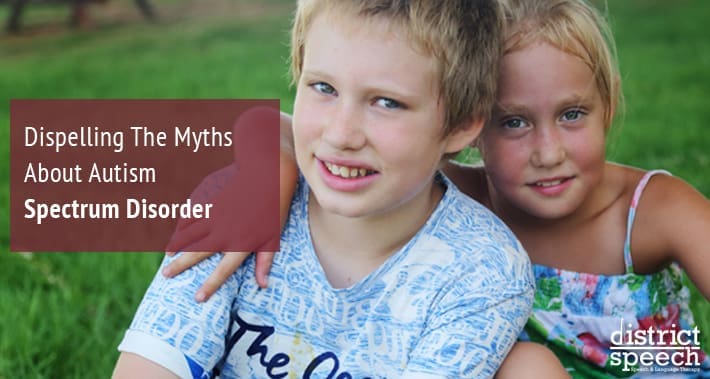
Autism spectrum disorder is often a misunderstood disorder.
There are many myths that surround autism that range from simply wrong, to very harmful.
These kinds of myths can often be part of harmful stereotypes about autism that many people believe.
If your child is autistic, it’s important for them to receive speech therapy for autistic kids that is rooted in evidence, not myths.
Let’s take a look at some of these myths and why they aren’t true.
Myth: Autism Is A Disease
You might have heard someone say or imply that autism is a disease.
Perhaps you’ve heard people talk about finding a cure for autism, or even had someone tell you they believe you can “catch” autism from something.
However, this just isn’t true.
Why It’s False
Autism isn’t a disease.
Autistic people aren’t ill.
We haven’t discovered a cure for autism, and it’s unlikely we ever will.
There are lots of factors that can contribute to causing autism, like genetic factors and environmental factors, but there’s no way to “catch” autism.
What’s The Truth?
Autism is a neurodevelopmental disorder.
This means it’s a brain difference that affects development.
Usually this is noticeable in an autistic person’s difficulty with social skills and interaction, and some autistic people may have communication impairments.
However, autistic people are capable of living healthy, independent lives with the support of therapy and other interventions.
Myth: Autistic People Are Antisocial
The myth that autistic people are antisocial is a common one, because of their differences in social skills and communication.
Why It’s False
It might seem like autistic people are antisocial because of how they interact with the world.
Some autistic people may be shy and avoid social situations, while others may struggle to have back and forth conversations because they speak so much.
For autistic people, non verbal communication like facial gestures, tone of voice, and body language can be hard to understand.
All of these factors can make it difficult for autistic people to understand how to interact with other people, but it doesn’t mean they don’t want to.
What’s The Truth?
Autistic people desire social connections and want to form relationships with others just like anyone else does.
However, it can be more challenging for autistic people to do this.
If you know someone who is autistic at work or school, taking the time to get to know them and engaging in their interests is a great way to bridge the communication gap with them.
Myth: Autistic People Don’t Feel Emotions
This is a myth that is particularly harmful to autistic people and leads to the myth that autistic people are antisocial.
Some people think that autistic people can’t feel emotions, which means they aren’t interested in friendships or other relationships.
Why It’s False
Because autistic people communicate differently, some people interpret that difference in communication as an inability to feel emotion.
In reality, autistic people often just have trouble understanding other people’s emotions.
Body language, facial expressions, and social nuance all play into emotional expression.
These are all also things that autistic people struggle to understand, which can impact their ability to understand emotions.
What’s The Truth?
Autistic people experience a full range of emotions, just like anyone else.
While they may have difficulty understanding emotional expressions, that’s not because they’re uninterested or unwilling to understand the emotions of others.
Speech therapy can often help autistic people learn to read the emotions of others and connect with people.
Myth: Most Kids Grow Out Of Their Autism
Sometimes autism is presented as a childhood condition.
After all, you often only hear about how it affects children, and most children are diagnosed in the elementary school years.
Why It’s False
Autism doesn’t stop at the end of childhood.
With the right intervention and support, autistic traits might be less noticeable in adulthood, or they might appear in a different way.
Autistic adults are also an under researched group, so they’re often less represented than children which can give the impression that they don’t exist.
What’s The Truth?
Autism is a neurodevelopmental disorder, which means it’s a difference in someone’s brain that lasts their whole life.
Remember that every autistic adult was once an autistic kid.
It’s important to support autistic people at every stage in their life, not just childhood.

Myth: Everyone Seems To Be Autistic These Days
This is a very common myth about autism.
Many people think that autism has become more common among children today than ever before.
Why It’s False
Over the last couple decades, autism has become more understood than ever before.
Researchers have a much better understanding of autism, which has led to clinicians being more skilled at diagnosing it.
What does this mean?
People who may not have been identified as autistic in the past are now receiving autism diagnoses.
What’s The Truth?
The prevalence of autism isn’t really increasing at all, our ability to detect it has just gotten better.
This means that more people who are autistic and need access to support are being identified and able to receive the understanding they need.
Myth: Bad Parenting Causes Autism
This is a particularly harmful myth and there’s absolutely no evidence that it’s true.
Why It’s False
Simply put, bad parenting cannot cause autism, and having an autistic child says nothing about someone’s parenting ability.
It comes from a theory from the 1950s that was called the Refrigerator Mother Hypothesis.
This theory said that mothers who were cold and distant could traumatize their children so badly it would cause autism.
However, this theory has been scientifically shown to be false.
What’s The Truth?
There is no parenting style that can cause autism.
Autism is a neurodevelopmental disorder that has been shown to have genetic links.
Parents of autistic children are no more or less likely to be poor parents than any other parent out there.
Myth: Vaccines Cause Autism
This is another myth that is quite harmful and lacks any evidence to say it’s true.
Why It’s False
In the 1990s, a research study was published that linked vaccines to autism.
However, in the following years it was shown that the study was not up to scientific standards.
Not only that, it was completely debunked and its findings have never been able to be repeated.
The physician who conducted the study was actually stripped of his medical license because of how he conducted this study.
What’s The Truth?
Just like we’ve said before, autism is a neurodevelopmental disorder.
That means that, quite simply, vaccines cannot cause autism.
Book Your Appointment With District Speech Today
Don’t let these myths fool you.
If you suspect your child might be autistic, they can still grow up to live a happy, healthy, confident life.
At District Speech, we can help them get there.
Book your appointment with District Speech today.
1300 I St NW, Suite 400 E,
Washington, DC 20005
- https://g.page/districtspeech
District Speech and Language Therapy specializes in speech therapy, physical therapy, and occupational therapy solutions, for both children and adults, in the Washington D.C and the Arlington Virginia areas.